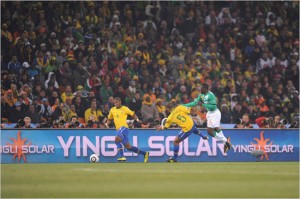After a slow start into the first six months of 2010, solar energy is on the rise – at least on Wall Street.
According to a recent Barron’s article, the solar industry in general is on a more firm foundation than the Street generally believes.
Could there also be something else at work that has raised the profile of solar energy as a viable and mainstream clean energy alternative?
With the ongoing environmental and economic disaster of the Gulf oil spill, solar energy has quickly moved back into the global conversation about energy options. Look no further than the World Cup.
In our June 12th article about the 2010 FIFA World Cup and the record numbers of viewers around the globe, we pointed to Yingli Solar, a leading solar energy company, as an up-and-coming advertiser who recognized the branding and strategic opportunity of the World Cup to introduce the company and brand with on-field advertising. After investing $20 million for 64 games and gaining worldwide exposure in TV, online and mobile audiences, the six-year old company now has the eye of a major investor.
As reported in The New York Times, “The World Cup is a fantastic platform to get our name out,†according to Robert Petrina, managing director for the Yingli Green Energy Americas division of Yingli who likened the growing interest in soccer in the United States to the growing interest in sources of renewable energy like solar panels.
Our company is well known in the industry we’re in and has grown to be one of the best-known brands in the space. But to move to the global stage is a massive step. The decision was made with the input of all the various offices around the world,†he added, which include Madrid, Munich and Rome — located in three soccer-mad nations, it should be noted.
Over 64 games, the $20 million investment equates to $312,500 per game. Considering that FIFA officials expect to exceed a cumulative 26 billion people, an average of approximately 400 million viewers per match, and factoring the additional online and mobile audiences, both the company and solar energy industry gained exposure. For Yingli, the investment has already achieved even more with a commitment of $5.3 billion to expand its manufacturing operations.
Brand Trust Is Worth Gold.
Thanks to the World Cup, awareness of solar energy may begin to galvanize interest in local and nascent solar energy providers who need the boost in exposure. Many of these promising companies have limited marketing resources to promote their technology and products are unable to invest in even modest brand-building activities. They could certainly use the boost.
Diez Energy Solutions in North Texas is a case in point.
For Jorge Diez, owner Diez Energy Solutions, his brand’s reputation is built one customer at-a-time on the strength of value, service and support since the solar category has yet to have greater brand recognition
Originally from Spain and avidly watching his team win the World Cup, Mr. Diez noticed Yingli’s branding efforts throughout the tournament yet remarked:
At this point my residential and commercial customers aren’t influenced by any particular brand, instead they are looking for good value and a reputable provider. Brand names are not something the customer is in tune with yet.
For small companies like Diez Energy Solutions that don’t have the resources of global companies like Yingli Solar, yet have a profound opportunity to make a positive impact on the environment and a chance to build a formidable business, how do they truly differentiate their offering and stay relevant over the long term?
This is where brands come in. Brands matter in all markets, especially so in emerging markets like solar energy.
In a Reuters article from last fall, “SunPower’s chief executive Tom Werner stands behind his company’s branding strategy. Does brand matter? I think it is definitively yes today, Werner said. Will it be sustainable? Of course that’s subjective, but you see tons of examples where brand and scale matter,â€
Brands Cut Through Clutter
In a category like solar energy, the supplier needs to cut through the morass of the market, get noticed, and connect with the customer on many levels and in ways that matter and not just deliver the facts. A strong brand becomes the customer’s “shorthand” for making good choices in a complex, risky, and often confusing marketplace.
Brands Tap Into Emotional Drivers
Brands matter because companies act just like people when it comes to evaluating what products or services to buy. Along with various explicit rational criteria, a powerful irrational impulse is always present to influence the purchase decision. A strong brand with an effective positioning strategy speaks to and taps into the totality of these buyer needs.
Brands Produce Economic Value
A brand is an intangible financial asset. A brand’s “goodwill†drives billions of dollars in value and market capitalization every year. One look at the value of blue chip technology brands like IBM, GE, Intel,Apple, etc to see that their brands, not necessarily, their products, are the differentiators that lead to their competitive advantage. There is ample empirical research in the finance world to attest to marketing ROI that strongly correlates with stock return. One study over a ten period of technology companies shows on average a 70% correlation between brand equity and stock performance. In other words, a direct and positive relationship exists between brand image for technology companies and their financial performance.
The principle applied from technology companies is true for solar energy: customers who have a positive brand experience that is integrated, consistent, easy, and expected will more likely become customers again. Loyalty drives brand economic value according to leading marketing and brand valuation experts.
Whether it’s a worldwide stage for a global company or a local market for an enterprising company like Diez Energy Solutions, brand trust is worth gold.
This post is also on Science Creative
